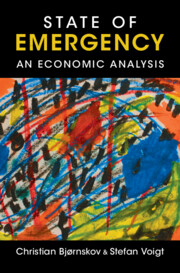Book contents
- State of Emergency
- State of Emergency
- Copyright page
- Contents
- Figures
- Tables
- Acknowledgments
- 1 Introduction
- 2 The Architecture of Emergency Constitutions
- 3 The Determinants of Emergency Constitutions
- 4 Why Do Governments Call a State of Emergency?
- 5 The Effectiveness of Emergency Constitutions after Natural Disasters
- 6 When Does Terror Induce a State of Emergency? And What Are the Effects?
- 7 States of Emergency after Domestic Turmoil
- 8 Dealing with Disaster
- 9 Keeping up the Balance between the Federation and the States
- 10 Constitutionalized Media Freedom during Emergencies
- 11 Unconstitutional States of Emergency
- 12 The COVID-19 Pandemic, States of Emergency, and Reliance on Executive Decrees
- 13 Returning to the Status Quo Ante?
- 14 Contracting for Catastrophe
- 15 The Future of States of Emergency
- References
- Index
3 - The Determinants of Emergency Constitutions
Published online by Cambridge University Press: 01 November 2024
- State of Emergency
- State of Emergency
- Copyright page
- Contents
- Figures
- Tables
- Acknowledgments
- 1 Introduction
- 2 The Architecture of Emergency Constitutions
- 3 The Determinants of Emergency Constitutions
- 4 Why Do Governments Call a State of Emergency?
- 5 The Effectiveness of Emergency Constitutions after Natural Disasters
- 6 When Does Terror Induce a State of Emergency? And What Are the Effects?
- 7 States of Emergency after Domestic Turmoil
- 8 Dealing with Disaster
- 9 Keeping up the Balance between the Federation and the States
- 10 Constitutionalized Media Freedom during Emergencies
- 11 Unconstitutional States of Emergency
- 12 The COVID-19 Pandemic, States of Emergency, and Reliance on Executive Decrees
- 13 Returning to the Status Quo Ante?
- 14 Contracting for Catastrophe
- 15 The Future of States of Emergency
- References
- Index
Summary
Although nine out of ten countries have emergency provisions written into their constitutions, the nature of these provisions remains poorly understood. We therefore aim at providing first answers to two straightforward questions: (1) which factors cause the inclusion of emergency provisions into constitutions? and (2) given that emergency provisions are constitutionalized – which factors determine the type of emergency provisions enacted? We find that the way in which a country’s constitution is produced has important consequences for its emergency provisions: constitutional assemblies dominated by legislators are loath to grant the executive many extra powers. Further, emergency constitutions in countries with stronger veto institutions and higher average income allow more discretionary power. This also holds for countries that recently experienced a coup. Interestingly, countries prone to natural disasters and countries far from the equator allow less power.
Information
- Type
- Chapter
- Information
- State of EmergencyAn Economic Analysis, pp. 44 - 66Publisher: Cambridge University PressPrint publication year: 2024
